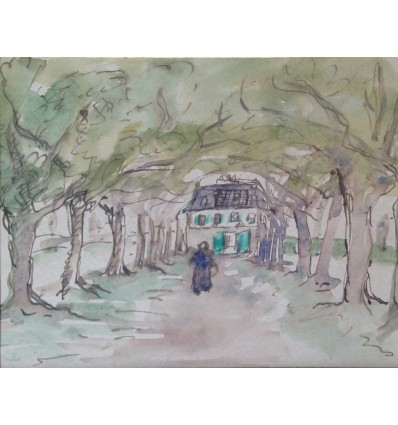International Shipping Secure Payment
No products
Product successfully added to your shopping cart
There are 0 items in your cart. There is 1 item in your cart.
Jean Frélaut (1879-1954)
The House at the end of the alley
Watercolour framed under glass from 1908-1910
Origin: Family succession
Format (at sight): 10.5 x 13.5 cm
Format (frame): 22 x 25 cm
Biography
Born on July 17, 1879 in Grenoble and died on December 23, 1954 in Vannes, Jean Frélaut is a French painter, engraver and illustrator.
Her family settled in Brittany, where she was born, when her father retired, and came to live in the family property at the place called "La Haie" in Vannes. Jean Frélaut completed his secondary education at the Jules Simon High School. At the age of 18, he went to Paris, in 1897, he entered Fernand Cormon's studio at the École des beaux-arts de Paris. He learned the engraving technique of Marcel Beltrand and Donald Shaw Mac Lauglan.
He travels to Europe and North Africa. Mobilized, he was made a knight of the Legion of Honour in 1919. He participated in the group of independent engraving painters, founded by Jean Émile Laboureur and Raoul Dufy in 1923.
He returns to live in Morbihan. In 1937, he was appointed curator of the Vannes Museum. With Jean Émile Laboureur and Pierre Dubreuil, he decorated the École Nationale de la Marine Marchande.
Author of more than 1,500 plates, he received the French engraving prize at the Venice Biennale (1934).
Jean Bersier described him as follows in 1948: "From the day Mac Langhlan introduced him to the profession of aquafortist, he applied himself, with a tenacious and thoughtful will, to engrave in copper the intense love he felt for nature and for the soil of his ancestral territory. The Morbihan, rough and tense, lends itself magnificently to Frélaut's descriptions.
Jean Frélaut's engraved work is present in the collections of the Musée de Vannes and the Musée départemental breton (Quimper), which also has some drawings of his own.
Sources: Benezit, Wikipedia




